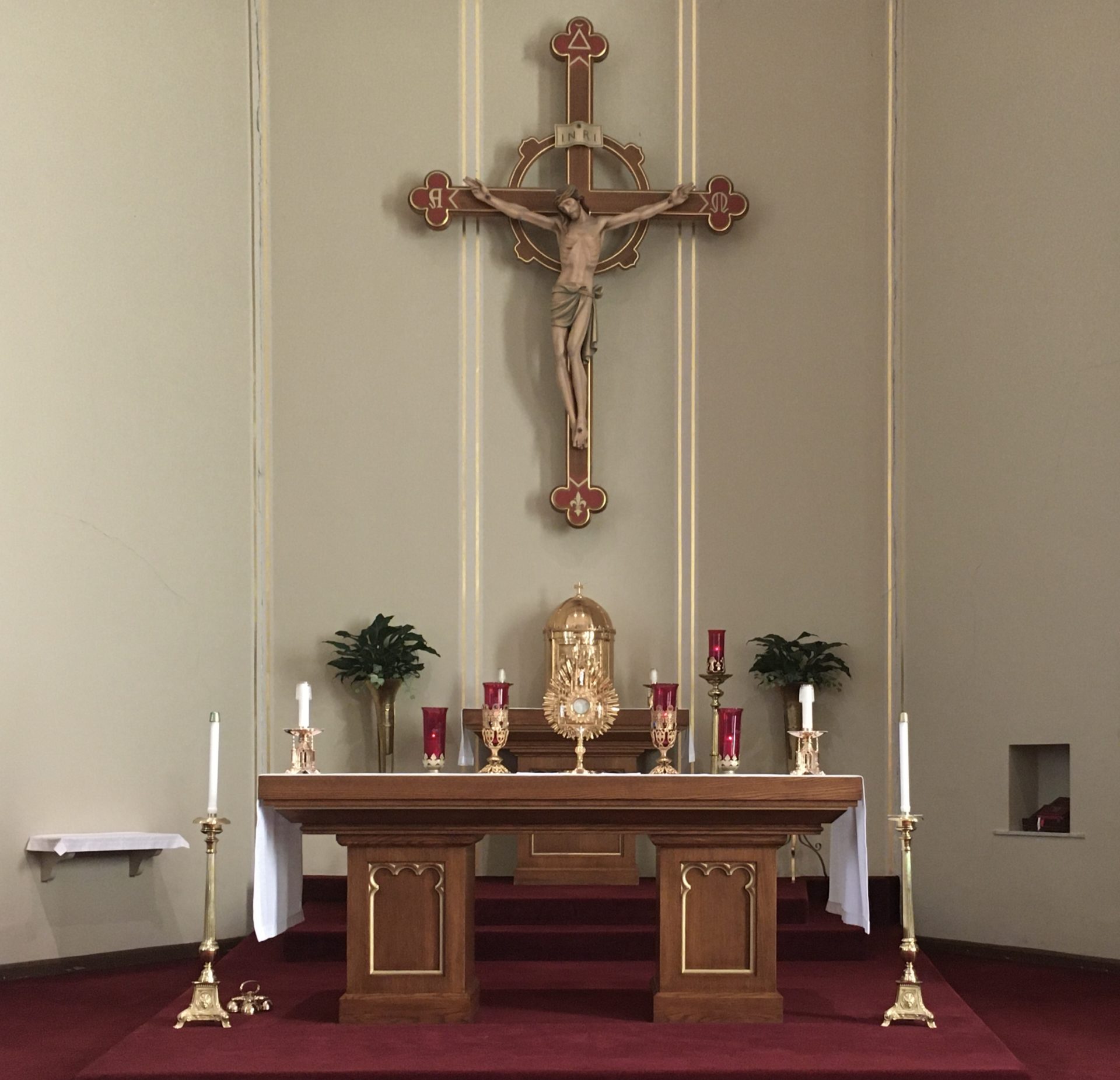COLLEEN JURKIEWICZ
CATHOLIC HERALD STAFF
For more than 20 years, St. Francis Borgia in Cedarburg has offered hours of adoration before the Blessed Sacrament on Mondays.

The St. Francis Borgia site on the corner of Hamilton Road and Washington Avenue in Cedarburg is now used as a site for Adoration. (Submitted photo)
But when parishioner Christina Garni told people about the dream that she and others had to offer 24-hour adoration Monday mornings through Friday afternoons, most told her she was crazy — and she loved it.
“People were saying, ‘We can hardly fill up Mondays — why do you think we can do this?’” she said. “I said, ‘I’m not doing anything.’”
From the beginning, it was a project that seemed to be driven by the Holy Spirit.
“I just knew this was going to happen,” said Garni. “It was a total surrender, a total leap of faith.”
With the support of St. Francis’ pastor, Fr. Patrick Burns, the initiative to offer expanded hours of adoration not only got off the ground, it soared — even through a storm no one saw coming.
“If we had waited any longer, it would have been nearly impossible due to the virus,” said Fr. Burns. “This provided a place of refuge and peace in a time of uncertainty and anxiety.”
Since the 2002 merger of the two Cedarburg parishes, St. Francis Borgia and Divine Word, the historic St. Francis Borgia site in the heart of downtown Cedarburg has been used primarily for daily Mass, weddings, funerals and special events. Sunday Mass, the parish school and most other operations are based out of the “North Church” campus on Covered Bridge Road. When Fr. Burns was appointed administrator of the parish in 2017 (later to become pastor in 2018), he wanted to make greater use of the old stone church on the corner of Hamilton Road and Washington Avenue — specifically by using it as an adoration chapel.
“It was amazing to see that others had a similar idea,” he said. “When I was named pastor, it was clear that due to the good work of previous pastors and dedicated parishioners, we had a parish with an appreciation for Eucharistic adoration.” The Monday hours of adoration were first instituted under Fr. Father Ed Wawrzyniakowski by parishioners Dorothy Thimmesch and Mike Senglaub in 1998.
The new, near-perpetual Adoration hours officially began on Ash Wednesday 2020, and everything was going well — until the abrupt advent of COVID-19 shuttered places of worship all over the state, suspended public Mass and introduced an element of fear and anxiety into daily life that no one on the Adoration Committee could have anticipated.
Specifically, it posed a giant risk to the fledgling initiative that parishioners had worked so hard to establish.
“I didn’t want it to be shut down,” said Garni.
With adoration chapels in other parts of the archdiocese closing, more people were drawn to St. Francis Borgia to pray before the Blessed Sacrament. Because the entire church was utilized for adoration, instead of just a small chapel, it was possible to allow up to 10 people in the building at a time, but it was necessary to be vigilant about hygiene and proper social distancing. Hand sanitizer and disinfectant wipes appeared at various locations throughout the church, and adorers were asked to wipe down their pew after use. Access to the church was restricted to only one door, and the Adoration Committee had to work to monitor the number of people in the church at any given time.
It was all worth the effort, said Fr. Burns. “Even with the obstacles that we faced, it was so clear that making adoration available was God’s will,” he said.
Five tumultuous months after its inception, adoration is stronger than ever at the parish. Though several adorers withdrew from their committed hours out of caution for their own health or the health of loved ones, others quickly stepped up to fill the needed times. Hours were recently extended even further into Friday afternoons.
In late April, the Adoration Committee invited adorers to share personal testimonies of how their time before the Blessed Sacrament had helped to sustain them during the pandemic.
“Adoration took on a whole new meaning … (it) became a mission,” wrote one adorer. “Pray for my business and employees, for work cancelled that we hope returns. Pray for kids now at home trying to learn while staring at a screen, deprived of playgrounds, laughter and friendships. Pray that fear, despair, sloth, addiction and apathy will not destroy my family, parish and community.”
“Our world has changed. My business has turned upside down. My world has been rocked. My Jesus has become my lifeline,” wrote another.
“People call me ‘father’ not primarily as a title of honor, but as a term of endearment,” said Fr. Burns. “Every priest is called to be a spiritual father. In the time that public worship was shut down, many priests felt unable to feed their spiritual children. Eucharistic adoration was one way that we could still feed the hungering hearts of our people. Through adoration, my parishioners were able to look on the face of Jesus and hear his comforting words in their hearts. They were able to stay connected to our crucified and risen Lord even in their own struggles.”
